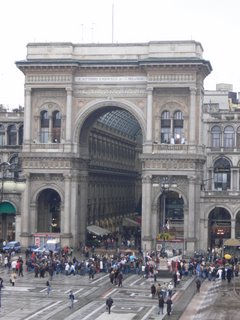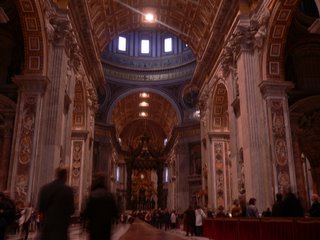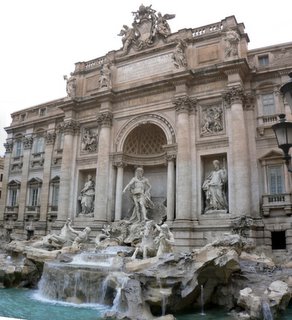
Thursday, December 29, 2005
Narnia
Of course, you could always argue Narnia was much easier to adapt; the length of the book and the relatively simplistic themes it encapsulates are far easier to adapt than Tolkien's monstrous epic - that does not change the fact that was a good movie. It could even be said the movie was better than the book, like Orson Scott Card claims. Despite this, although LOTR is still the greater achievement, Narnia stands no smaller because of it. Adamson deserves kudos for what he has managed to accomplish in this movie.
Lewi's opus was first and foremost meant to be an allegory. Not only that, a children's tale, with all the embellishments you'd expect of one - the conservative stereotypes, the anthropomorphization of animals, the happy endings and the lot. This means Lewi's story may fall short in terms of sheer entertainment value, at least to adults. The movie lends a graver, more serious air of tension and conflict. It no longer feels like a children's movie. Makes commercial sense; or some other pseudo-cynical excuse, but there's that.
I thought the children's acting was good - on par, at least, with that other big budget children's movie franchise, Harry Potter. I won't go into detail here. I thought Tilda Swinton (the White Witch) could have injected more subtlety into her ice-queen villian role. And somehow, though, the image of a straw-clad amazon riding on a sleigh pulled by polar bears, clutching a dagger isn't very intimidating. Fortunately the grim impact of that particular scene is mantained by the devilish orc-analogues trudging along.
Adamson has a talent for depicting battles. His directing ability is good; the cinematography excellent. It never seems like a children's movie; the narrative is depicted almost through an adult's perspective, as though one were peering through glass to witness a world that encapsulates every conception of the nursery rhymes or comforting bedtime stories of early life. One depicted in lush detail and more than a little surprising realism.
The plot remains the same as it ever was. Aslan's reincarnation, though very fittingly theologically sound, is rather kitschy and contrived - but it's handled as well as it could have been in the movie, although rather abruptly. Other than that the movie stays faithful to the book to a surprisingly large degree, although perhaps less so given the brevity of the original book.
Music was excellent. Gregson's score beats John William's latest efforts hands down. Its etheral themes and resounding cadences lend a magical quality to the world of Narnia. Without the music Narnia would be much less powerful than it is.
Weakest point was the plot, of course, but that can't be helped. And the plot is at least decent and sufficiently believable to pass off. The heartwarming finale and poignant capstone shrug off the preceding contrivance and brings the magic to the pinnacle. Never has my innate cynicism been more frowned upon. Though I wouldn't call myself a cynic. And cynicism in moderation is not always a bad thing. Science is the study of skepticism, after all. Political studies even more. The "best" books are always cynical, though; the so-called literati fall upon themselves and squeal delightedly at the "raw worldliness" and "mature realism" these tomes invariably contain to nausea, so much so that the virtue of innocence has been forgotten in literary canon. Sometimes I think that all non-cynical books are clamped indiscriminately into the children's genre. That's why Toynbee lambasted LOTR, and Harry Potter is regarded as children's reading material (although it is; I would rather classify it as teenager-centric reading material).
Well, in any case, I found Narnia more...satisfying than Kong. If faced with a choice of purchasing either DVD I would choose Narnia with only slight hesitation.
New Year is coming. The most depressing holiday of the year, for obvious reasons. Sometimes I wish we could adopt the British system and start our terms at September. That would be a nice change. And the weather, too.
Sunday, December 25, 2005
Postcolonial Hangover
So, anyway, these people speak unsullied chinese of the first degree, which would put the most "chinky" among us to shame, most probably including the scholars. Which is no surprise at all, since it is, after all their primary language. What really tickles my tiny mucus-tendrils this time is that, contrary to what Russell Peters would have us believe, their "Thirty Five Fifty's!" are enuncianted in flawless english with an impeccable American accent. Perfectly, and with a crazy vocabulary to boot. Yes, there was a guy called Anthony among them, and no, they didnt pronounce his name in that "EH-PUH! (apple) CAN-DEE!(candy)" cantonese accent we so love.
Well yeah granted, they are, after all, from Xsin Chu American school. This, however, also means that they dont even TAKE chinese in school! Which led to a couple of them claiming that their Chinese "really really sucked". Painful, for me. Oh, did i mention they also spoke fluent french? (Uh. thinks of excuse). Oh God.
Also, turns out we have something really similar to them! See, this is me learning something new and getting GGed (uh, Good Gamed!) by my sister again.
Me: "Hey, do you guys speak dialect?"
Taiwanese guy: "Uh, a little taiwanese."
Me:"Oo, taiwanese."
Taiwanese guy: "Yeah! Like uh, Le Jia Ba Buey?"
Me: "Yes, i have eaten, hahaha!"
Taiwanese guy: "HAHA cool you understand!"
Me: "Yeah, seems like Taiwanese and Hokkien have the same etymological roots!"
*Returns home from Clubmed*
Me (To sister):"Hey, did you know that Taiwanese and Hokkien have some words in common?"
Sister, who just returned from a one month stay in taiwan: "Uh. By the way, Taiwanese IS Hokkien." *Unnerving I-honestly-cannot-believe-you-have-motor-skills glare*
Haha. Pwnt.
So, back on track. See, this whole linguistics thing also happens to tickle my Singaporean-mucus-tendrils *shakes fist angrily at chen shui bian*. I've always felt that the reason why us as Singaporeans never managed to master either language, at least without sacrificing the other to a large extent, was because somehow or another our brains would just explode because of some cosmic constant that impedes multilingualism. But these people are living proof that that's not true! And as a Singaporean, that makes me feel awfully insecure. I dont know.
But the thing is: it's disturbing, the whole accent issue. What really peturbed me about the people I met is that they actually had this whole self-doubt thing, where they went up to me and asked "Hey, do I have a Chinese accent? Because we sound really Chinese to the Americans *cue frustrated grimace*", in that really, really, REALLY, scary, American accent they had. To which, in my state of...catatonic terror (*loses 2d6 moves*), I replied casually "Uh, you guys sound absolutely American to me!".
They responded estatically, with a "Thank you!" and a *pleased smile* , as though I just said that they could all make a living like Kate Moss (refusing to get out of bed for less than 10 grand) or that Taiwanese street snacks rocked (which they do, by the way. except for the chicken) . Hey, and I thought ACSians were bananas! Then i guess they're..uh. Dragonfruits! Dont ask why. The nail in the coffin was when they asked me, genuinely, if Singaporeans spoke in a British accent. Like, 'op of the 'morning to you, guv'nor. S'ry! S'rsly! haha nah thats not British. But the point of my telling you this whole story is:
Haha, Red Tanks shoot better than Green Tanks. But i'm not Waasley :) that vampiric bugger has done this to me no less than FOUR times in the past week! Man I'm dumb. anyway, the REAL point is:
Well see, I think we take Postcolonialism for granted. I, like the Artbiter, do not appreciate Naipaul. Or at least the two novels I've read, anyway, his first two pieces (mystic masseur/miguel street). Honestly, I think his work deserves as much literary merit as Amber Brown Is Not A Crayon, both of which should be placed under the "Will Seriously Dement Your Kid" segment of the Children's section, right next to Calvin and Hobbes. The thing you have to keep in mind when reading Naipaul is this: he pioneered the whole genre of postcolonialism. The way he flourishes his native Trinidadian colloquial English (uh, Tringlish?), would put the whole "Who Owns Singlish?!" debate to shame. He manages to come to terms with his identity; he derides, not worships, the cultural convert as a traitor to his notion of self. He doesn't have to alternate between EITHER an American accent OR a British one! For that alone, this guy deserves a nobel prize. He pioneered a genre that was unspeakably radical in that 1950s world of his, with the shambled remains of an empire and a rising commonwealth. His work defined the terms and mindset by which the peoples of nations, just like ours, acted, spoke, and lived.
So think about it: How many of our movies are just about "The Asian Condition?". Eric Khoo: he's hardly the best film maker in the world. So why does he get critical acclaim? Because he portrays things as they are, he's fine with Singaporeans speaking as they do. That Thai guy who made a sixteen hour long movie: well, apart from showing you how life in Thailand is a tiresome nightmare where you really, really, want to pee but Just Cant Go, is he really scoring points on anything other than novelty? The novelty of someone, from an *shock* Asian *shock* country, being able to come up with his own version of English and claim its as legit as anyone else's? Even now, to so many people, the notion of something this "alternative" is revered. Which is why I think that the main reason why half of us were falling asleep in lit class this year is because its ALREADY established ground. To us, its like: "Move On Already! take out a gun or take off your shirt! do Something!". We've never lived in a community like Achebe's, nor Naipaul's, nor spent our lives in an American school, trying to adapt to their traditions and way of life. We simply, simply, cannot understand. Its a fundamental mismatch of wavelength.
To us: postcolonialism is history, it's passe. We're post-post-colonialists. We're fine with ourselves. We're proud to be Singaporean; not the stupid caramalized good-english-clean-roads version we're Taught, but the hawker-food-eating, lah-leh-ing, ah-beng-bashing tropical dwellers that we Are! More importantly, we take it as a given.
And that, my friends and dear readers, is why we're Anglo-Chinese. And oh yes. ( Independent ) .
By the way, Merry..uh..Boxing Day!
$#@!*% Nova took Christmas! Even despite the time zone difference!
Tuesday, December 20, 2005
King Kong
Yes, she looks fairly like Charlie Chaplin and seems in her element. Then she gets fired. Jackson's King Kong adaptation is an infusion of disparate styles that do justice to all aspects of the movie. And yet, like sullen echoes on a pond, we can make out Jackson's personal touch. That unique blend of quiet humour that more often than not is everything to the progression of the movie. That masterful depiction of unendurable horror and barbarism. The stark reality of predicament and unutterable futility of action that is so evident in his previous works.
Naomi Watts lends a desperate, charming energy to her Damsel-in-distress character of Ann Darrow, a comedian-actress found lacking in the luck department. The horror of the possibility that she could end up in a burlesque drives her straight into the waiting, megalomanical arms of the monomanical movie director Carl Denham, played by Jack Black with uncharacteristic dignity and seriousness. Denham, of course, stakes everything he has left on his latest pet project, a pseudo-documentarian expedition to hitherto unexplored Skull Island, accompanied by playwright and Darrow love interest Jack Driscoll, played with nervous reticence by the pianist, Adrien Brody. The rest is history. Movie history.
King Kong is best described as a fanboy's dream come true. Jackson is the richest fanboy on earth and he means to spend it wisely and cash in on the returns. What can I say? He relies on his previous success and the reputation that comes with it and spins a miasma for the studios. They snap it up. Luckily Rings wasn't a fluke, because he delivers the goods, this time in true mindless blockbuster perfection. Brontosauruses, giant bats, leeches, gorillas, T-rexes, you name it, there isn't a pause in the animalistic action in the legacy of all those old man vs. animal flicks like Jurassic Park, Jurassic Park 2 and Jurassic Park 3 (et al.)
What sets King Kong apart is its emotional core. Bonds and love and loss and suffering; they come in equal portions with the action. Darrow and King Kong develop a strange, unfathomable relationship; the heart of the beast softens for a beauty. "It was beauty that killed the beast." Driscoll and Darrow, couple in a young blossoming love that should have had more screen time; Kong vs. Driscoll in the subject of Darrow's affections, what couldn't be more disturbing? Horror and hope, civilization vs degeneration, love vs betrayal. The webs too complex for a simple paragraph to cover.
No need to talk about Jackson's direction. Or cinematography. They're good.
The chief flaw of this film is its pacing; I would have preferred less action by far; which would shorten the movie into a more manageable 2.5 hours. Of course, the final scene, that classic sequence done in modern CGI polish, is worth the long 3 hour wait.
Watch it. Anything Jackson makes post-LOTR is probably worth watching, no matter the subject.
How to End A War
Be awed at its grandeur. Be awed at its simplicity. For it is of two edges, for peace, for misunderstanding. It began the war That Took a Billion Lives and ended it, but only when its cause had been lost in the depths of time and Jandrith shared-memory disposal. For it is written by Our Kin, that once was Our Implacable Enemy. It is written in haste and misunderstanding. What began as a peacable dialogue is now cause for mourning. Mourn, O People, for what is lost in the blood of a million suns. Weep for what could have been.
Taken from Kar'Tal'Huuman (The Report on the Humans), as dictated by High Augur Nast'kil to Various Appendages, 88084 of the Kil'vas and 3407 of the Era of the Imperium (EI). Translated by Jonash Kyger, First Scholar to the Court of Terra, 4624 of the Era of the Imperium (EI).
"
1
M'Highest Dictator. Herein is the Report on the Humans. Herein lies Your Subject's eager and unrestrained counsel. The Subject most assuredly suggests immediate war (Option A3) with these mammalian hallucinogen-inducers. (note this translates to Jar'ki'dilvan'dil, a conventional Jandrith curse used for formal occasions. For more information on Jandrith physiology refer to Sandar Koon's Imperial Study on Jandrith Physiology, AA1.)
2
Let Us denigrate Ourselves by offering an Inadequate Explanation to Your Ears. The Diplomatic Function with the humans held on their home planet of Terra, upon First Contact, has dislodged Our Radiosensitive Patches (Jandrith ocular organs) to the unwashed barbarity of this species.
3
These humans have similar requirements to mantain their repulsive physiques as Ours, M'Highest. Immediately following the Contact ceremony the humans invited Us to what passes as an Immersion experience with these unsophisticates. The humans have this concept they call Culture (kuul'cher). We feel ashamed to have received this well at first. We can only drag Our Appendages in chagrin. The head ambassador of the humans invited Us to a Cultural Experience on Terra, the equivalent of going out to observe the unwashed activities of the Common Strata (Kell'tar'klos) of these humans. A portion of this activity took place in the human's food distribution centres.
4
We feel We must explain a facet of this human Culture to Your Munificence, M'Highest. The humans do not heed Our Way. Their strange and repungant mentalities embrace an ideology so removed from Our Own as to be diametrically alien to Us. Unlike Our Food Distribution Centers, that dispense nutrients to One and All in equal proportion, these humans repel the golden caress of Our Way and seek the anti-egalitarian, using packets of conceived value to exchange for items their physiques require, as if their technologies were insufficient to provide in Equality for All. This complicated process was explained to Us by the ambassador, and We profess the profoundest confusion. It seems to Us that the human system of Economics (Ek'nom'necs) is so hopelessly contorted as to abandon all rationality.
5
In any case, We halted at a centre dispensing foodstuff humans require to keep their physiques in shape. The human ambassador terms these foodstuffs Vegetables.
6
Indeed, M'Highest. The humans display the flayed remnants of their invalids for consumption! From their horrible green ganglia to the marrows of their limbs, they hang them all up for their own terrible ends! If You consult Your records, it shall be seen that Vegetables are what humans call their Gil. That such unutterable terror should be unleashed upon the Universe! It was all We could do not to flee at once. For these humans do not merely partake in such degeneration, they flaunt it openly. For now we know they are scions of the Trickster Deity, and spin lies at His whim. Everything humans say is a lie. Everything they do is contrary to Our expectation and Our Way.
7
It was easy enough to perceive the truth after the human ambassador denied Our Perception, for he lies. It is in his nature to do so. He cannot tell the truth. Everything humans say is a lie.
8
The humans rounded off their filthy discourse by invoking a paradox to Augur Go'kan'thos, which killed Them. The humans must be annihliated, their carbon-based biochemistries subjected to schizophrenic contusions. This is Our conclusion.
"
As you can perceive, the Report smoothed misunderstanding once understanding and communication was achieved. The Report ended the War. It paved the way for the Great Law of the Planets, which set the parameters for communication with further aliens. It gives rise to a new era of peace everlasting. It stops the production of paradox guns.O people, witness your salvation in the hands of Jandrith folly and wisdom.
Wednesday, December 14, 2005
Various Mutterings
Just an example of how brilliant this film was. Hanks is stranded alone. Yet in the course of his singular existence he paints a face out of his own blood on a Wilson volleyball (one of the various packages fortitiously surviving the plane crash with him). This volleyball, aptly (and somewhat predictably) named Wilson, becomes the second most powerful character in the entire movie, based entirely on Hank's interaction with it and cunningly-crafted direction.
A volleyball! No dialogue, no actor's wages, no paparazzi smearing gigs. No credit.
When [spoiler] Wilson is lost at sea on the inevitable return trip, the sheer sense of tragedy is almost overwhelming, not only to Hank's character, but to the viewer himself.[/spoiler]
Words fail me. Go watch it yourself.
***
Jackson might have made his magnum opus (opi?), but it seems he hasn't lost his touch, from what I can tell from the rave reviews on King Kong. Not as good ("of course", the reviewers say) as LOTR, but excellent nonetheless. Some even go so far as to declare it better than the original, which is unheard of, at least until now.
***
Anyway, on Jackson's magnum opus. Based on my loose quantitative analysis of the hype and reviews that have graced this triumph of cinematic achievement, I declare the movies overrated. Not by much, but overrated nonetheless.
My chief gripes are in the area of plot contrivances. Fran Walsh and Phillipa Boyens have sought to add their own minor alterations to Tolkien's epic. Bad move. Most of them are ill-judged and unbelievable. Not to mention kitschy.
[Rant mode begins here.]
1. Ents. Come on. Ents are the oldest "natural" race in Middle Earth. And yet you can tell me that Treebeard can be bamboozled by a simple and unbelievable rationalization of a half-grown hobbit barely a thousandth of his age, that the Ents are foolish enough to think that Saruman's machinations will not affect them if they stay put and hide, that they are complacent and inattentive enough not to notice the mass deforestation taking place right in their territory by Saruman's minions, and that this travesty could possibly be enough for the Ents to change their glacial minds and attack Saruman.
Ents are wise. That's how Tolkien depicted them. To twist this wisdom, to turn it into a sort of half-baked horticultural senility, is completely implausible. Why they had to change the plot is beyond my comprehension.
"Well, I think this proves that trees can become senile."
- Peregrin
2. Theoden. Whatever happened to that kindly, understanding man who treated Merry with respect and concern, who listened to counsel and followed the wise course of action. Instead we get the alcoholic reformer who treats everyone with barely concealed arrogance and suspicion and disregards Gandalf's admonitions. Who commits his forces only with reluctance. All contact with Merry is removed from the film. The one released in cinemas, in any case.
Theoden is not like that. His character in the book was believable enough. Intercharacter tension can arise from elsewhere. Theoden is a foil for Denethor. They represent the contrast between the two great kingdoms of Men. Now the erstwhile Titanic captain gets to snub his nose at Aragorn and teach lessons to mules. Bah.
"I think I look better in leather myself."
- Theoden
3. Faramir. This makes me cringe. Another potential foil cast into the ravenous flames. Faramir doesn't warrant two ounces of rancid fat now that his character has been completely "revolutionized". The noble and valiant captain of Gondor is now inept at strategy (galloping in a line towards a sea of archers?) and cannot conquer his innate greed. Faramir is another foil, this time for his brother. Well, until the scriptwriters got it into their heads to "give some depth to this character who can oh so magically shrug off the corrupting effects of the ring."
Wham. Faramir becomes as bad as his brother. Another character lost.
"It was the hair. I know it was the hair."
-Faramir, inconsolable
4. The Frodo-Sam schism (Gollum's work, it is, precious!). What gives? Can the sacred friendship really be so strong? Oh, no, it's not nearly realistic enough for Hollywood, is it? Let's get the villian to mouth off a few incriminating lines to seemingly separate them...forever! (And then reunite them, of course. Those fans will never stand for that.)
Hmm. What ever should we do to pull this off? Let's spin some yarn about Samwise stealing some lambas bread! As if he hasn't starved for his master so faithfully over the past few months, carried all their things for him and saved him from a Nazgul! Wait. We'll have to change that too!
"Yeah, he used to stick the finger up at me all the time. Until
Gollum chewed it off. Now he has to use the other one."
-Samwise Gamgee
[Rant mode ends.]
Doubtless LOTR is still a great trilogy. It's strengths outweigh its weaknesses by far. If only they'd not gotten it into their minds to spice things up a bit. Kind of like emptying the entire box of cheese into a plate of spaghetti. And adding anchovies afterwards. I'd take the spaghetti myself. With one or two of the anchovies afterward. No, that was not allegorical. Yes, that was a homage to the man himself.
***
I have been rereading Wheel of Time. Doubtless many condemn it as too slow for their tastes but I like Jordan's universe. I think reading is more of an exposure to viewpoints than mere entertainment. And that's why books with messages tend to be better received that books written for the sole purpose of beachside entertainment.
I think Dan Brown's work is brainy enough. I see some labeling them otherwise. In my opinion that's a patently unfair slur based entirely on his controversial book topics. His writing style is not simplistic, its accessible. He is an Exeter grad and an academic himself. His assertions are not the point here; all are welcome to debate about whether those assertions are valid or not. But as to the quality of his books, there can be no doubt that he writes good ones.
Dan Brown is not, as popularly believed, anti-religion. He is Christian enough. You might call him the modern day equivalent of a Gnostic, or an Arianist, because he does hold several radical ideas about the Christian creed. But aren't all denominations like that, all divided on minor issues of semantics and interpretation? What does it matter? I don't believe any of his books would undermine faith in any way. If his dissenters read carefully into his work they'll see that all "anti-Christian" opinions are solely the opinions of characters, and not of the author himself. And as to the question of Christ's marriage to Mary Magdalene, while he has asserted his belief in that, I don't think it makes him any less a Christian.
Sunday, December 11, 2005
GoF and the Rest
I. Harry Potter and the Sorceror's Stone
This Columbusian effort should be lauded for its attempts to portray the book to its best extent. Radcliffe displays appropriate boy-wonder at his newfound circumstances. Setting and environments are beautifully and faithfully rendered and executed, especially Hogwarts and the Lake. Grint (Ron) and Watson (Hermione) are decent. Grint in particular shows a talent for acting his part with all of Ron's particular quirks, pecularities and idiosyncracies, an ability he will improve on in latter films. Watson acts well but her Hermione portrayal isn't quite on the spot.
The film itself is a little rushed, especially the Dursleys segment. Maggie Smith (McGonagall) is stern enough to fit her character, although she might want to build on the latent warmth her character (in the books) can show at times. Harris is a disappointment. As Dumbledore he must be energetic and quirky, and his age, though physically apparent, must never be highlighted in his demeanor and actions. Yet, Harris, though majestic enough, rushes his lines, speaks in a hoarse, slurring voice, and displays little emotion of any sort. Columbus's austere direction in relation to intercharacter interactions does little to alleviate this.
The direction itself is average. While the great cinematic pans that show off environments and scenery in Potter's Wonderous World are done with artistic flourish and a dose of audacity (like zooming through a window) Columbus has less skill in directing his characters. There are no poignant moments. Columbus has prior experience in directing children. It shows, but the scenes containing adults have less import and focus.
The book is adhered to to a middling extent. The main alterations involve the cutting or omission of certain elements in the book, and there isn't much of it. However the result is that the movie feels rushed; it seems like certain elements are added only for the sake of pleasing purist fans. In my opinion this shouldn't come in the way of making a cohesive movie that has the same relaxed pace of the book. Although, of course, if such alterations are only for the worse, like the butcherings of the Ents, Elrond, Faramir and Theoden's characters in the LOTR movies, then they should not be done.
Overall Sorceror's Stone is a decent effort, and while it may not have the same impact as the LOTR or Contact adaptations it nevertheless remains enjoyable to watch.
II. Harry Potter and the Chamber of Secrets
By far the worst-made movie in the franchise. Everything that was good in the first movie is missing. Everything bad in the first movie is painfully accentuated.
The acting of the three main characters deteriorates somewhat, except Grint's. Radcliffe no longer has any cause to display the boyish wonder of the first movie, and the emotionality is a bit over his head at this point. The opening scene is lacklustre, failing to capitalize on the potential humorous import. Dobby is terribly voiced and animated, and his conversations with Harry are faltering and unrealistic, on a level far below Serki's Gollum rendering. The entire polyjuice potion sequence is painful to watch. Harry and Ron just give too much away for Malfoy not to notice. The shock of Hermione turning into a cat analogue is painfully underdeveloped. Myrtle, however, acts well, albeit in a slightly over-the-top fashion.
Coltrane (Hagrid) is as ever the quintessential half-giant Hogwarts gamekeeper, and he provides one of the best performances in the entire franchise. Harris, however is worse in this film. His voice has grown even more hoarse and he seems to be rather detatched from the entire course of the film. Radcliffe's voice is also breaking, along with Grint's, which spoils their dialogue somewhat, as it's a little harder to determine tonality and emotional impact from them, and it just sounds like a low-quality audio recording.
I would also like to pour detriment on Tom Riddle's absymal acting. He is worse than Harris. Imagine a teenage boy looking fairly like Clarke Kent in Smallville voicing cheap stereotypical villan lines and laughing like an incarcerated madman. While all the time acting disinterested and showing minimal facial expression, and doing absolutely nothing to Harry as he climbs around the chamber avoiding the Basilisk except shouting "no!" at appropriate moments just like he would to a brick wall. (I know that's what he does in the books, but the movie just makes it seem ludicrous.)
Columbus's directing is uninspired and dry, going even further than austere. The Quidditch match is "made more dramatic" (and it isn't really, just boringly drawn-out), even though it is described as one of the shortest in gaming history in order to denote the extent of Malfoy's incompetence and the advantage of skill over money. Apart from what I will refer to as the "Columbus epic pan" (wide sweeping pans used to establish setting and accentuate environmental impact on the scene) the direction is at best lacklustre.
Music is also a sticking point. While the themes are typically good (he is, after all, John Williams), the environmental soundtrack used during moments of drama, tension, et al leaves much to be desired. The same thing with Episodes II and III of Star Wars. Ironically Episode I had the best music of the lot.
The sole beacon in this large mess is the character of Lucius Malfoy. Played with charisma and genuine threat, Isaacs delivers the goods; ever the quintessential villian, he makes another strong appearance in The Patriot, playing the bluster-spouting Brit, Colonel William Tavington.
Overall, however, Chamber is quite a pain to watch, start to finish. It's bogged down by virtually everything that counts in a film of quality, and the result, though understandable enough to the viewer, gives an impression of...well, inadequacy.
III. Harry Potter and the Prisoner of Azkaban
Thankfully, Azkaban is a much better movie than either of the former, thanks in part to the pressures of time. In a franchise where the children are the most essential to the success or failure of the movie it never hurts to have a director who, at least, knows his stuff.
Although Cuaron hadn't worked with children before this film the acting of the Big Three is much better now. Part of the reason is, of course, the pressures of puberty, weaving its hormonal magic among the stars of the show. They are more able to cope with the adult issues inherent in the books, and since they're all older than the prescribed age they are supposed to be acting, it's all the better.
The trailer was misleading, I must say. The deceptively edited scene of Hermione punching Malfoy struck me as an inept piece of direction, but thankfully the movie didn't turn out like that. Cuaron's direction retains Columbus's sense of epic scope and adds an additional human dimensionality to the film in a way that wasn't overly present in the previous films. Cuaron incorporates humour and drama, even horror, in a seamless tapestry of beautifully rendered environments and (relatively) human interactions.
Dumbledore has been replaced with another actor, following Richard Harri's unfortunate death in the process of shooting. Gambon is a much more energetic Dumbledore than Harris. Although he has little of the mild wisdom of Dumbledore's character in the books and is actually rather messy-looking (and he rarely smiles in the movie). Overall I'd say Gambon is a better Dumbledore, which is more appropriate to the increasingly Dumbledore-centric stance of latter novels.
David Thewlis is perfect as the werewolf professor Remus Lupin. He has the exact combination of warmth, competence and scruffiness I'd expect from Lupin. Although I don't know about the moustache.
Gary Oldman would have been excellent, if it weren't for the persistent casting of his abilities in villian-roles. This served quite well for his tenure as the mistaken murderer of twelve Muggles, but after the Revelation it just becomes rather surreal, with all the images of his prior roles as villians swimming around disconcertingly in one's mind (Air Force One, Lost in Space etc.) Oldman is another one of those villian actors, just like Jason Isaacs and Rufus Sewell (A Knight's Tale, The Legend of Zorro, and Joaquin Phoenix looking uncannily like him in Gladiator). He was in Batman Begins and if you didn't notice him there he was Commissioner Gordon. Commissioner Gordon. And we all saw him in Air Force One and Lost in Space playing the irredeemable wretches Ivan Korshunov and Zachary Smith. And he was the villian in The Fifth Element. And Dracula.
Ok. Enough of Oldman.
One of the best moments in the franchise so far is Harry summoning the Patronus Light and realizing the fallacy of his self-doubt. Not only is that an extremely significant moment it is also one of the high points of the franchise. Everything about that scene is perfect, from the score to the direction to the acting to the special effects to the dialogue. It was a beautiful moment in a great movie.
Azkaban is made great by the redress of the problems present in the first two movies. Everything from directing to dialogue provides so much more impact to the viewer this time around. The final moments of the film are also masterfully rendered, with the scene and setting providing much of the atmosphere and mood. A fitting capstone to the best movie of the four.
IV. Harry Potter and the Goblet of Fire
Thought I was going to be careless and put IIII?
Goblet of Fire is a difficult movie to review. Its's massive, the most ambitiously conceived of the franchise to date. It also has a markedly different tone from the other movies. Once again, a different director takes the helm of the filming. Newell has a markedly different style. Difficult to place, but sequestered nonetheless.
There have been many complaints about this particular movie. While I considered it quite enjoyable to watch it isn't as evocative or powerful as Azkaban and does have its slow moments. The chief complaints seem to focus on the stark differences between the movie and the book. And it is true that the producers changed a hell lot. From tiny little details to larger ones and gaping omissions, they haven't exactly been lenient on the paring knife and the correction tape.
Entire plotlines have been shifted around, taken out, played with, eaten and excreted in a way purist fans find putrescent. The Dursleys have been purged. The Quidditch World Cup is dealt with in 15 minutes. The game isn't even shown. All that's revealed is the not so good-natured strutting matches between the opposing teams and the aftermath, which involves a rather pathetic reenactment of the sorely-missed match by the Weasely twins. Skeeter's eventual demise is removed as well. Personally, I'm not fussy about such changes, as long as they contribute positively to the movie itself. And these omissions are indeed necessary to pare down the length of the already lengthly movie.
The acting of the Big Three remains good. The characters have matured in ways not entirely alien to the pubescent populace, those who have lived with Harry for the years of his story now. Hermione shows off her, uh, assets in the Yule Ball, looking exceptionally elegant in a pink gown. (Not blue! The purists wail.) Ron and Harry are typical gangly awkward looking teenagers undergoing the throes of puberty. Ron is the sad one. Supporters of the Ronermione pairing (a name of my own coining) will wince at their obvious complicated miscommunication-perception-acceptance love marathon-maze that threatens to upstage dragons in potential threat parameters, as Harry so succinctly puts it. (The actual quote was something like "I'd rather face one of those dragons again than ask a girl to the Ball.")
Dumbledore and McGonagall are better than ever. Gambon is in his element and even shows his softer side now, although he is as scruffy as ever. I only wish they'd included Sirius Black in the flesh, his character provides much in the way as a foil and contrast (and parallel) to Harry's own.
Fiennes is a creditable Voldemort, although he does come across as more fishlike than I'd expected - with his reddish eyes, missing nose and pasty white skin. Though he does radiate a sense of formidable evil in his incongruously cultivated British accent.
What I didn't like was how the Riddle House scene was cut down and altered so drastically - that removed much of the depth from the movie. Although the movie itself was less complex than the book, a necessity to fit two and a hal hours of screentime.
Cedric's death and the tragic scene of Amos clutching his son is another well-crafted moment. The emotional import is present and revolutionizes the course of the franchise, transforming something light-hearted into a progressively darker and more brooding saga in the books and movies to come.
Goblet is, all in all, a reasonably well-made movie, entertaining, yes, but encompassing a few faults of its own, mainly in the preserve of plot progression. Here's to OotP.
Overall Ranking
1. Prisoner of Azkaban
2. Goblet of Fire
3. Sorceror's Stone
4. Chamber of Secrets
Monday, December 05, 2005
Evrpa
The two destinations of this trip were scenic, neutral Switzerland, home of the UN and bastion of engineering prowess, and ancient, temperamental Italy, with its monuments, Catholic centralism and pickpockets. As the plane touched down on the snow-packed runway of Zurich International I began to have an idea of the cold. Apprehensive, maybe. My expectations of the weather were frightfully bolstered by pictures of frostbitten fingers caked with gangrene and bad movie stills of Batman and Robin. Fortunately (or otherwise), such fantasies collapse in upon themselves when faced by the mighty force of empirical reality.
This is Switzerland.



Well. The first was probably taken near the German border, and the third shows the Swiss Alps. The second picture is Lucerne, a Swiss city.
The view from the top of the Jungfraujoch, the Top of Europe.


The Swiss are a truly pan-European society. The UN Headquarters are in Geneva, the primary language in the north is (Swiss) German, the primary language in the south is (Swiss) Italian, Swiss guards protect the Pope in the Vatican, and most of them speak English as a second language as well. Switzerland has retained its strictly neutral position since the 1500s, refraining from participation in most, if not all, wars, that could have potentially involved it. Combined with their traditional industrial, financial and technological niches as well as thir relatively stable economy and society, and one gets something close to what constitutes as an ideal a society as is possible given human nature. Of course, Switzerland is not without its faults. I am told that some sectors of Swiss society are given to racism, and the Swiss, of course, trap themselves within a cul-de-sac of sorts, achieving a sort of cultural stasis that is partly evidenced by the archaic nature of their Germanic dialect. But these are few and far between.
Another selling point of the Swiss, of course,would be its natural beauty. It is a place of lakes, glaciers, mountains, forests, the like. The primary terrain of this naturally mountainous country seems to be naturally craggy, which is obvious given the fact that most of Switzerland resides within the Alps. The compensation is revenue from winter sports and tourism, and the chance to enjoy mountains and clean air every morning.
On to Italy. This nation, this boot, is rather different from the serenity of Switzerland. Noisy, congested and a cradle of a beauty of a very different sort, and rather lacking in natural beauty of the igneous kind, this journey meanders through the old principalities of the fragmented city-states of the Italian peninsula, and harking back even further to the days of the Caesars and Marcus Aurelius. Milan, Verona, Venice, Florence, Rome. Cities full of an ancient splendour and a modern squalour, pickpockets and beggars at virtually every turn, bustling with lead-pumping cars, graffiti and the threat of a hidden Mafia member just around the corner (only, of course, in Sicily). Italian cities are a special breed. Every city resembles a dual-layered onion. The old city, in all its architectural and religous splendour, resides in the centre, and the modern morass sprawls around it. Even Venice is no exception, flooded as it is.
Italy; Milan and Venice.



Rome was a disappointment of circumstance, not nature. Polluted as it was, it was still given to majesty. But the proceedings were devastated by a torrent of rain such as Rome has (by the words of the chagrined tour guide) rarely seen. To rub salt in the wound, the very next day, the end of the Rome tour, had absolutely beautiful weather.
The Vatican was interesting. One really gets the sense of the power vested into the papal authority, one that rules over hundreds of millions of individuals over many nationalities and cultures. Cultural wealth and the diversity of religous art and its monuments is diplayed in the most magnificent of fashions. Michelangelo's frescoes on the walls of the Sistine Chapel, his architectural masterpieces, St. Peter's Cathedral and Square, the paintings, mosaics, sculptures and structures spanning the length and breadth of artistic tastes of eras then and now - they are testament to the power of religion and its artifices. Rites and culture, atavistic and hallowed, juxtaposed against the modern chaos of today's frantic reality; that is Italy.
Unfortunately, the weather was so terrible that only a few pictures of Vatican City are available, and all are obscured by the elements. I rage against their caprice. Sadly, the Sistine Chapel does not allow for photos to be taken in its interior, because of a) typical Italian suspicion, and b) "precautions taken in the name of art".

Predictably, the Vatican is also crowded by tourists and pilgrims.


If I'm not wrong, that's St. Peter's. I'm not on a helicopter in that point in time so the more traditional aerial view isn't available.
Refer here for that view.
Rome was in crisis that day. Everyday there's another crisis. The crisis of the day was rain and traffic jams in rain. Another poignant visitation was to the city of Verona, of Shakesperean fame.
This is reputed to be Juliet's balcony. Not the Shakespearan Juliet (in the sense of the Shakespearan Richard III or the Shakespearan Julius Casear) but the one the play (and the one before it) was based on.

In my opinion, thoroughly unromantic. Because of the weather, maybe.
The Leaning Tower of Pisa and accompanying structures.


In Rome, there are two things outside the Vatican that are said to be, on any visit there, sinful to miss.


A more traditional view of the Colesseum was made impossible by the rain.
All in all, Switzerland and Italy showcase what is so iconic about Europe; it's laid-back attitude, fueled by the sheer weight of its history, its natural beauty, its grandeur and history and religon and art. And maybe food.
I shall top this off with a last photo of Napoleon with a bird sitting on him.

Sunday, December 04, 2005
Twinkle Twinkle
Xiao Ming was a rather fortunate boy. He seemingly had a large majority of local schoolchildren in his employ, strenuously pounding pen against paper in transcribing his daily encounters, grinding the moral lessons within for ease of inculcation. In that way, he had been a celebrity from birth, with teachers, parents and students alike addicted to his literature, breathing the permeating eraser dust of Confucian values and idealistic endings.
His relations said he was precocious. You would be too, if you spent as much time thinking as he did.
What confused him at present, though, was why four letter words would earn one a good slap and an ensuing spanking when used in English, and yet, when used in his mother tongue, would be assessed as evidence of one’s linguistic flair. He dutifully attributed this contradiction to the all pervasive and highly invasive Western Influence, with an accompanying apt nod of the head and cocking of the neck. He missed such simple problems, for they almost served as a distraction. The black clouds ushered the white out of the sky, and he lay still on his bed once more.
Stardom, however, still carried its usual perils in his world. He did after all have a lot to live up to. In fact, it was in his very name. Xiao Ming – small, and bright. Like a star. Except that stars weren’t that small, come to think of it, they could swallow, cleanse and consume worlds in a blink of an eye. But for most purposes, he preferred a petite image. In any case, even his companions, or what was left of them, claimed that he was all “Spaced Out”. It seemed that fate conspired to elevate him above the common, observing benevolently as the world ran its course and exhausted itself, open for his taking. After all, stars always had a bright future, which was of course a particularly spectacular death, although the exact time that “future” would come was always accurate to only a few million years.
Anyhow, it was for this future that he was alive, bothering to draw the next breath and to pump the next beat of his tiny heart. It didn’t matter at all what he was by day, because then he was but a hapless boy, fresh off Madam Tussaud’s wax press. Except for the bed sores, the limp mouth, and the broken body; she wouldn’t make those, no one wanted them. The same way no one wanted to know what really happened to Xiao Ming, so long as he remained a shining beacon, an example to all children under the age of twelve, after which they were surrendered to the other stars; Madonna, Britney, and dear old Celine. Well, even a paralyzed boy was better than those three, he supposed.
As the amber light streamed through the slits in his confinement, he reached down and picked up one of his bedtime stories, written by a schoolchild of seven in slender cursive on paper with blue stripes. Xiao Ming and the Awful Car Accident, the title proudly proclaimed. According to this one, he had crossed the road without looking, but the car had stopped in time and everyone learnt a lesson. How touching. He sensed the sting of salt in his eyes. He didnt know what to feel.
Then it was night again, his turn to shine.
~A solemn tribute to chinese, which i am not taking next year
